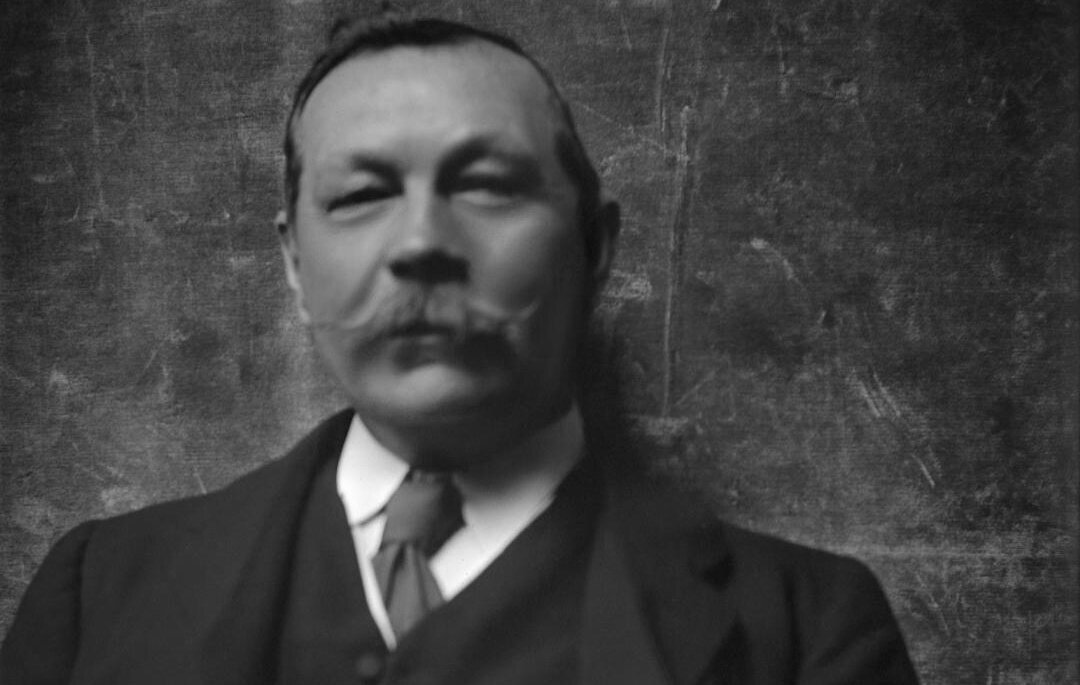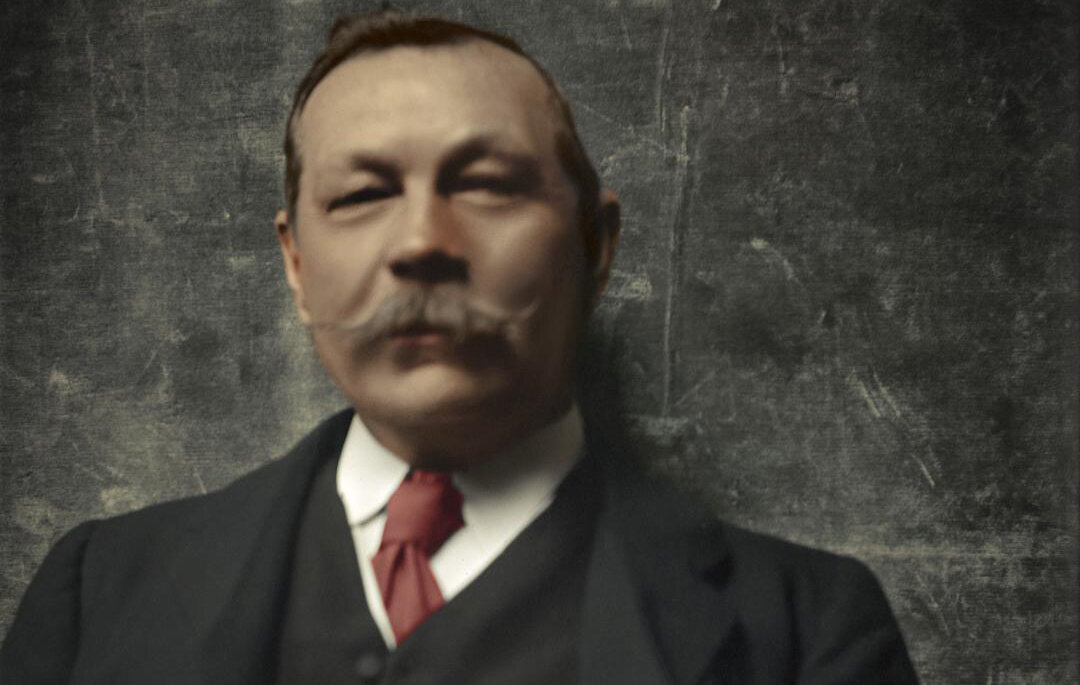Arthur Conan Doyle’s Crusade: Shrabani Basu (1907)
Shrabani Basu, author of The Mystery of the Parsee Lawyer
Few crimes can be said to be as sinister and perplexing as the ‘Mystery of the Parsee Lawyer.’ In this episode the journalist and Sunday Times bestselling author , Shrabani Basu, takes us back to a crime that captivated Edwardian Britain.
*** [About our format] ***
In 1907 the British public were engrossed by a series of newspaper reports written by the creator of Sherlock Holmes – Sir Arthur Conan Doyle. For years fans of the Baker Street detective had written to Conan Doyle, soliciting his help. They brought news of little puzzles, strange goings-on, cold cases, but until his received a letter from George Edjali he refused to have anything to do with them.
George’s story was different. It was instantly transfixing. He was, he informed Conan Doyle, the eldest son of Britain’s first ever Parsee vicar. He had grown up in the vicarage of the parish of Great Wyrley in Staffordshire. For years his family had been subject to racial abuse. Menacing letters had been posted through the door. Stolen objects had been left in the garden. One of the notes starkly captured the hostility the family faced. ‘The Edjalis are Wicked’ it declared.
This vindictive campaign against the family had lasted for more than a decade. Then, in 1903, events had taken a disquieting turn. Livestock in and around the parish had been attacked: ripped through their bellies and left to bleed to death.
As the number of carcasses had mounted, the suspicions of the local police force had intensified against George, who was then working as a solicitor. In the local quarter sessions in 1903, George had been convicted on threadbare evidence and sentenced to seven years of penal servitude.
“The explanation of the choice is probably to be found in the circumstance that Edjali is of Eastern extraction. The subtle Eastern mind loves a mystery, and is vain ... The Eastern mind is satisfied with its secret.”
George’s incarceration coincided with the return of Sherlock Holmes, in Conan Doyle’s bestselling tale, The Hound of the Baskerville’s. Impressed by Holmes’s deductive method of reasoning, after reading the novel while imprisoned George decided that Conan Doyle was the perfect person to help him clear his name. By 1907 George was free, released early amid unease about his conviction, yet still with the crime against his name.
So stood events at the beginning of 1907, the year Shrabani Basu takes us back to analyse in this fascinating episode. At the heart of her story the doughty George and the romantic Arthur, allied in a quest to correct a clear miscarriage of justice.
In a story that closely resembled the Dreyfuss affair of a decade earlier, the duo confront racial prejudice, wild stereotypes about the exotic East, a lax police force and an establishment unwilling to admit that it has made a mistake.
*
Click here to order Shrabani Basu’s book from John Sandoe’s who, we are delighted to say, are supplying books for the podcast.
*** Listen to podcast ***
WIN A COPY OF
The Mystery of the Parsee Lawyer
To be in with a chance of winning a hardback copy of The Mystery of the Parsee Lawyer, just “like” our Facebook page. Deadline Sunday 21 March 2021. Winner notified by message.
Show notes
Scene One: January 1907: Arthur Conan Doyle makes a trip to Great Wyrley and visits the scene of crime. He visits the vicarage, the locals and his last stop is at the house of Captain Anson.
Scene Two: George Edalji gets a free pardon after ACD's piece is published in the Daily Telegraph. But he is not given any compensation, which leaves ACD incensed. He decides to reveal the true identity of the Wyrley Ripper. The game is afoot.
Scene Three: September 1907. ACD is on his honeymoon. A crucial lead comes through. He feels he has solved it and has the final proof. But does he?
Memento: George Edjali’s coat.
People/Social
Presenter: Peter Moore
Guest: Shrabani Basu
Producers: Maria Nolan
Titles: Jon O
Follow us on Twitter: @tttpodcast_
Or on Facebook
Podcast Partner: ColorGraph
See where 1907 fits on our Timeline
About Shrabani Basu
Shrabani Basu is a journalist and author. Her books include Victoria & Abdul, which is now a major motion picture, and For King and Another Country. In 2010, she set up the Noor Inayat Khan Memorial Trust and campaigned for a memorial for the WWII heroine, which was unveiled by Princess Anne in London in November 2012.
Jordan Lloyd’s colourised image of Sir Arthur Conan Doyle
Featured images from Great Wyrley
Location of Great Wyrley in Staffordshire (Map)
Listen on YouTube
Complementary episodes
Chasing Doctor David Livingstone: Petina Gappah (1871)
In this invigorating episode, the Zimbabwean novelist Petina Gappah takes us in pursuit of the Scottish missionary and explorer David Livingstone. We follow the journalistic chancer Henry Morton Stanley as he attempts to find Livingstone […]
London’s Blackest Streets: Sarah Wise (1889)
For this insightful and evocative episode of Travels Through Time, Peter Moore heads to the historian Sarah Wise’s flat in central London, to talk about left wing politics, life and labour in the imperial capital in the year 1889.
Remnants of Partition: Aanchal Malhotra (1947)
In this superbly-evoked episode of Travels Through Time, the Indian writer Aanchal Malhotra takes us back to the cavalier, chaotic and catastrophic sequence of events surrounding Indian Independence in the summer of 1947
Click here to order The Mystery of the Parsee Lawyer by Shrabani Basu from our friends at John Sandoe’s Books.
The story of the son of a Parsi-convert vicar near Birmingham who, convicted for mutilating horses and writing threatening letters to the vicar, contacted Conan Doyle to unravel the mystery and clear his name. An eye-opening look at race and an unexpected friendship in the C20th. Remarkable research, fine writing. (John Sandoe’s)















